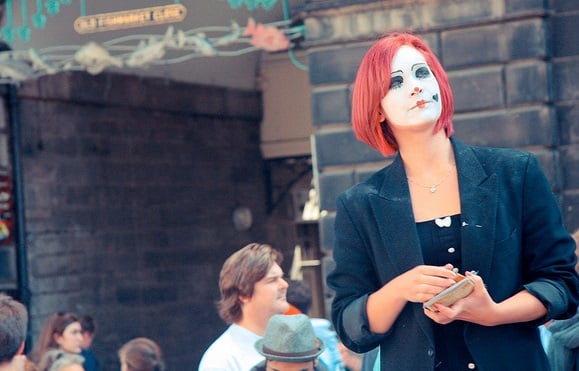
Photo: Laura Suarez (CC BY-SA 2.0)
Career guide: Arts marketing
What’s it like to work in arts marketing? And how do you get started? Sara Lock shares her journey and advice for those considering a career in the sector.
My story
I started dancing and playing the piano at the age of eight. By 14 I was too self-conscious to don a leotard in public. At 18, in a bid to avoid stage fright, I set off to Cardiff to study English Literature.
That turned into English Literature and Cultural Criticism, followed by a Postgraduate Diploma in Arts Management at the Royal Welsh College of Music and Drama.
I originally thought I’d go into education and community arts. As the course went on, I discovered that marketing involved many of the things I enjoy doing: writing, enthusing people about the arts, exploring human behaviour and analysing everything.
The course included a five-week placement at Lighthouse, Poole’s Centre for the Arts. I spent three weeks in programming and two weeks in marketing. Programming wasn’t for me but I thoroughly enjoyed my two weeks with the marketing team. I discovered a slightly geeky love of data, I wrote letters to audiences about exciting shows and researched organisations and individuals who might enjoy the work we were doing. It was busy and scary at times, calling people I’d never met, but I loved it.
Is marketing for you?
That’s just my story. Everyone I’ve met working in marketing over the past ten years has their own story. We’re all very different people. I’ve worked with introverts and extroverts. In the early days I worried that I was too much of an introvert to be good at marketing but that has never held me back.
I think the question you really need to ask is ‘Do I like to be busy?’
That’s the big thing for me. I love writing and chatting to people about the arts, I enjoy nosing through data, researching and dreaming up ideas, but if I didn’t like being busy I would hate arts marketing. You have press deadlines, you have advertising deadlines, you have show deadlines and you have big ambitions to develop new audiences while caring for existing ones. Working in arts marketing is busy!
Why work in arts marketing?
It gives you the opportunity to meet so many fantastic people: colleagues, artists, touring companies, audiences. Meeting Colin Dexter, author of Inspector Morse, was a highlight for me!
No two days are the same, so if you’re naturally curious and love learning new things it can be really rewarding.
It enables you to make a real contribution to the arts and cultural sector – the show can’t go on without an audience.
It allows you to make a difference to people by inviting those who may never have experienced the arts to join in.
It forces you to develop solid time management, communication and project management skills that will be invaluable throughout your life and career.
How do I get started?
There’s no hard and fast rule of how to get started. I took an academic path from arts A-levels and BA degree to postgraduate arts management studies. The practical placement within that course meant that I graduated with both academic knowledge and hands on experience. It even resulted in a job.
Many arts marketers start out working in a box office, often helping out marketing teams as part of their role. It’s a great way to understand audience behaviour and what it’s like to work in an arts organisation, while earning money at the same time.
It sounds obvious, but spend time looking at marketing job descriptions. It gives you an idea of what organisations are looking for and where you may need extra training or experience.
What are my career prospects?
There are all sorts of marketing roles within the arts and cultural sector. You might work in a venue, gallery or museum with a firm geographical base or market a touring company that performs nationally or internationally. You could concentrate on a specific artform or, like me, choose an arts centre that presents everything from visual arts to music, theatre, comedy and film. In larger organisations you may also have the chance to specialise in digital, PR or a specific area of marketing.
In terms of progression, there are many different levels from assistant or co-ordinator, to officer, manager and director.
Salaries vary significantly depending on experience level, location and the scale of organisation you are working in. As a guide, entry level assistant or coordinator level roles tend to range from £15,000 – £19,000 (£20,000+ with London weighting) while senior managers might earn anything from £25,000 to £50,000.
I started out as a marketing officer and then moved to a smaller organisation to take up my first senior management role. I was promoted to deputy director after a couple of years, giving me more strategic responsibility across the organisation as a whole.
Many marketing managers do go on to become directors or chief executives but that wasn’t for me. I was too passionate about marketing to leave that to someone else, so for my next challenge I have joined the Arts Marketing Association team as Associate Editor.
I’m now creating case studies and guides to celebrate best practice in arts marketing and fundraising for www.culturehive.co.uk. It’s a big change but I’m thoroughly enjoying sharing the work arts marketers are doing to develop new audiences.
The skills you develop in arts marketing are eminently transferable. Past colleagues have gone on to work for major national charities or chosen to set up their own consultancy or graphic design companies.
I hope once you get started in arts marketing you’ll never want to stop but, even if you do, the opportunities are endless.
Sara Lock is Associate Editor at the Arts Marketing Association.
www.a-m-a.co.uk
www.culturehive.co.uk
E: [email protected]
Tw: @amadigital
Join the Discussion
You must be logged in to post a comment.